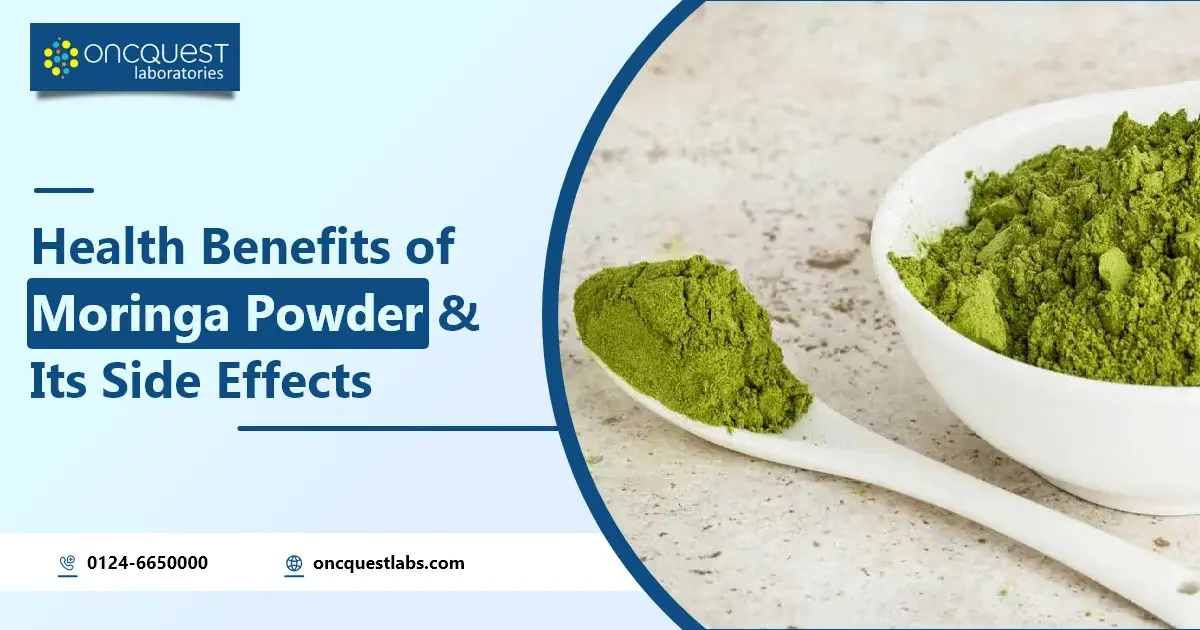Moringa, known as the “miracle tree” or “drumstick tree,” is native to parts of Africa and Asia, especially India, Pakistan, and Nepal. It has been utilized for thousands of years in traditional medicine for its potent health benefits. This highly nutritious plant is rich in vitamins A, C, and E, B-complex vitamins, and essential minerals like calcium, potassium, iron, and magnesium. Additionally, Moringa contains all nine essential amino acids, making it a complete protein source, and boasts high levels of antioxidants and phytonutrients. Moringa can be consumed in various forms, including powder, capsules, fresh leaves, and tea, each offering unique benefits and ease of incorporation into daily diets, making it a versatile superfood for enhancing overall health.
Contents
- 1 Nutrition Value of Moringa Powder
- 2 Health Benefits of Moringa Powder
- 3 Side Effects of Moringa Powder
- 4 Moringa Benefits for Women
- 5 Moringa Powder Benefits for Male
- 6 Moringa Powder Benefits for Weight Loss
- 7 How Much Moringa Powder Per Day
- 8 Dosage and Usage Recommendations for Moringa Powder
- 9 Conclusion
- 10 FAQs About Moringa Powder
Nutrition Value of Moringa Powder
Moringa powder is renowned for its exceptional nutritional profile, making it a potent superfood. Derived from the dried leaves of the Moringa tree, it provides a concentrated source of vitamins, minerals, and other essential nutrients. Below is a detailed table of the nutritional value of Moringa powder per 100 grams:
| Nutrient | Amount per 100g |
|---|---|
| Calories | 325 kcal |
| Protein | 27.1 g |
| Fat | 2.3 g |
| Carbohydrates | 38.2 g |
| Dietary Fiber | 19.2 g |
| Sugars | 6.7 g |
| Vitamin A | 16,300 IU |
| Vitamin C | 17.3 mg |
| Vitamin E | 113 mg |
| Vitamin B1 (Thiamin) | 2.6 mg |
| Vitamin B2 (Riboflavin) | 20.5 mg |
| Vitamin B3 (Niacin) | 8.2 mg |
| Vitamin B6 | 1.2 mg |
| Folate | 40 µg |
| Calcium | 2,000 mg |
| Iron | 28 mg |
| Magnesium | 368 mg |
| Phosphorus | 204 mg |
| Potassium | 1,324 mg |
| Zinc | 3 mg |
| Copper | 0.57 mg |
This table highlights the impressive nutritional benefits of Moringa powder, underscoring its value as a powerful addition to a healthy diet.
Health Benefits of Moringa Powder
Moringa powder, derived from the leaves of the Moringa oleifera tree, is celebrated for its remarkable nutritional content and health-promoting properties. Often referred to as the “miracle tree,” Moringa has been used for centuries in traditional medicine due to its rich array of vitamins, minerals, antioxidants, and bioactive compounds. Below are ten compelling health benefits of Moringa powder:
1. Rich in Nutrients
Moringa powder is a powerhouse of essential vitamins and minerals. It contains high levels of vitamins A, C, and E, which are vital for maintaining healthy vision, skin, and immune function. Additionally, it is an excellent source of calcium, potassium, and iron, which are crucial for bone health, muscle function, and oxygen transport in the blood.
2. Antioxidant Powerhouse
Moringa powder is loaded with antioxidants like quercetin, chlorogenic acid, and beta-carotene. These antioxidants help neutralize free radicals in the body, reducing oxidative stress and lowering the risk of chronic diseases such as heart disease and cancer. Regular consumption of Moringa powder can enhance overall health by protecting cells from damage.
3. Boosts Immune System
The high concentration of vitamins and minerals in Moringa powder strengthens the immune system, enhancing the body’s ability to ward off infections and illnesses. Vitamins A and C, in particular, play a significant role in boosting immune function and improving overall health.
4. Regulates Blood Sugar
Moringa powder contains compounds that can help lower blood sugar levels, making it beneficial for people with diabetes or those at risk of developing the condition. Studies have shown that Moringa can reduce fasting blood sugar levels and improve glucose tolerance, aiding in diabetes management.
5. Improves Heart Health
By reducing cholesterol levels and regulating blood pressure, Moringa powder supports cardiovascular health. The antioxidants and anti-inflammatory compounds in Moringa help prevent plaque buildup in arteries, reducing the risk of heart attacks and strokes. Additionally, potassium in Moringa helps maintain healthy blood pressure levels.
6. Anti-Inflammatory Properties
Moringa’s anti-inflammatory compounds, such as isothiocyanates, help reduce inflammation in the body. This is particularly beneficial for individuals suffering from inflammatory conditions like arthritis, asthma, and inflammatory bowel diseases. Regular consumption can help alleviate symptoms and improve overall quality of life.
7. Enhances Digestive Health
The high fiber content in Moringa powder promotes healthy digestion by aiding in bowel regularity and preventing constipation. Fiber also supports a healthy gut microbiome, which is essential for overall digestive health. Moringa’s natural antibacterial properties can help combat digestive infections and support gastrointestinal health.
8. Supports Brain Health
Moringa contains essential nutrients that support cognitive function and mental health. The high levels of antioxidants and neuroprotective properties help improve memory, mood, and cognitive function. Regular consumption of Moringa powder may reduce the risk of neurodegenerative diseases such as Alzheimer’s and Parkinson’s.
9. Promotes Healthy Skin and Hair
The vitamins and antioxidants in Moringa powder nourish the skin and hair, promoting a youthful appearance and healthy hair growth. Vitamin E and other antioxidants help reduce signs of aging by combating free radicals and promoting cell regeneration. Additionally, the high protein content supports strong and healthy hair.
10. Strengthens Bones
With its high calcium and phosphorus content, Moringa powder helps maintain strong bones and teeth. Calcium is essential for bone density and strength, while phosphorus plays a crucial role in bone formation and repair. Regular consumption of Moringa powder can help prevent bone-related disorders such as osteoporosis.
Incorporating Moringa powder into your diet can provide these health benefits, making it a valuable addition to a balanced and nutritious lifestyle. Its versatility allows it to be easily added to smoothies, soups, and various recipes, enabling you to enjoy its numerous health advantages.
Side Effects of Moringa Powder
Moringa powder, derived from the leaves of the Moringa oleifera tree, is widely celebrated for its numerous health benefits. However, like any supplement, it can also have potential side effects, especially when consumed in large quantities or by individuals with certain health conditions. It’s important to be aware of these potential side effects to make informed decisions about its use. Below are ten possible side effects of Moringa powder:
1. Digestive Issues
Consuming large amounts of Moringa powder may lead to digestive issues such as diarrhea, nausea, or stomach upset. This can occur particularly if the powder is not well tolerated by an individual’s digestive system.
2. Potential Toxicity
While Moringa leaves and pods are generally safe to consume in moderation, excessive intake, especially of the roots and bark, can lead to toxicity. These parts contain higher concentrations of certain compounds that may be harmful in large quantities.
3. Interference with Medications
Moringa powder can interact with certain medications, including blood-thinning medications (anticoagulants) and diabetes medications. It may alter their effectiveness or increase the risk of side effects. Consultation with a healthcare provider is advisable before combining Moringa powder with prescription medications.
4. Allergic Reactions
Some individuals may experience allergic reactions to Moringa powder, particularly those sensitive to plants in the Moringaceae family. Symptoms may include skin rash, itching, swelling, or difficulty breathing. Discontinue use if allergic reactions occur and seek medical attention.
5. Lower Blood Pressure
Due to its natural vasodilator effects, Moringa powder may lower blood pressure. While beneficial for those with hypertension, it can pose risks for individuals already on blood pressure-lowering medications, potentially causing excessively low blood pressure (hypotension).
6. Pregnancy and Breastfeeding
The safety of Moringa powder during pregnancy and breastfeeding has not been extensively studied. Some experts recommend avoiding its use during these periods due to potential risks of uterine contractions or hormonal effects.
7. Impaired Fertility
Certain compounds in Moringa may affect fertility in both men and women. High doses could potentially interfere with reproductive hormones or have contraceptive effects. Individuals trying to conceive should exercise caution and seek medical advice.
8. Liver and Kidney Health
Excessive intake of Moringa powder might strain the liver and kidneys due to its high concentration of certain compounds. Individuals with liver or kidney conditions should consult a healthcare provider before using Moringa powder regularly.
9. Gastrointestinal Disorders
For individuals with gastrointestinal disorders such as irritable bowel syndrome (IBS) or Crohn’s disease, Moringa powder may exacerbate symptoms like bloating, gas, or cramping. Monitoring symptoms and adjusting dosage is advisable.
10. Drug Interactions
Beyond anticoagulants and diabetes medications, Moringa powder may interact with other drugs, including thyroid medications and medications metabolized by the liver. It can affect drug absorption, metabolism, or excretion, potentially altering therapeutic outcomes.
Being mindful of these potential side effects and consulting with a healthcare provider before starting Moringa powder supplementation can help ensure safe and beneficial use.
Moringa Benefits for Women
Moringa, often referred to as the “miracle tree,” offers numerous benefits for women, making it a valuable addition to their diet. Rich in essential nutrients, moringa provides vitamins A, C, and E, as well as calcium, potassium, and protein, all of which support overall health and vitality. For women, these nutrients are crucial for maintaining strong bones, healthy skin, and robust immune function.
One of the key benefits of moringa for women is its ability to support hormonal balance. Moringa contains compounds that can help regulate hormone levels, potentially alleviating symptoms of PMS and menopause. Additionally, its anti-inflammatory properties can reduce menstrual pain and discomfort.
Moringa is also beneficial for lactating mothers. It is known to boost milk production due to its high nutritional content, providing essential nutrients to both mother and baby. Furthermore, moringa’s rich antioxidant profile helps combat oxidative stress, promoting youthful skin and reducing signs of aging.
For women looking to maintain a healthy weight, moringa can aid in weight management by boosting metabolism and providing a feeling of fullness due to its high fiber content. Overall, incorporating moringa into a daily diet can significantly enhance women’s health and well-being.
Moringa Powder Benefits for Male
Moringa powder offers numerous health benefits for men, making it a valuable addition to their diet. Rich in essential nutrients, moringa powder provides vitamins A, C, and E, calcium, potassium, and protein, all of which are crucial for maintaining overall health and vitality. For men, these nutrients support muscle growth, enhance energy levels, and promote strong bones.
One of the key benefits of moringa powder for men is its potential to improve sexual health. Moringa contains compounds that may boost testosterone levels, enhancing libido and sexual performance. Its rich antioxidant profile helps reduce oxidative stress, which can improve sperm quality and fertility. Moringa powder also supports cardiovascular health by lowering cholesterol levels and reducing blood pressure, thanks to its high content of potassium and antioxidants. This can reduce the risk of heart disease, a common concern for men as they age.
Additionally, moringa powder aids in weight management by boosting metabolism and promoting a feeling of fullness due to its high fiber content. Its anti-inflammatory properties can help reduce muscle soreness and improve recovery after workouts, making it an excellent supplement for active men.
Overall, incorporating moringa powder into a daily diet can significantly enhance men’s health and well-being.
Moringa Powder Benefits for Weight Loss
Moringa powder is increasingly recognized for its potential benefits in supporting weight loss, making it a valuable addition to a balanced diet and fitness routine. Rich in essential nutrients, moringa powder provides a powerhouse of vitamins, minerals, and antioxidants, which can aid in overall health while promoting weight loss.
One of the primary benefits of moringa powder for weight loss is its ability to boost metabolism. The high content of vitamin B complex in moringa helps convert food into energy more efficiently, increasing metabolic rates and promoting fat burning. Additionally, moringa’s high fiber content aids digestion and provides a feeling of fullness, reducing overall calorie intake and preventing overeating.
Moringa powder also contains chlorogenic acid, a compound known to slow the absorption of sugar into the bloodstream, helping to manage blood sugar levels and reduce cravings. This can be particularly beneficial for those who struggle with sugar cravings and energy crashes. Moreover, moringa’s anti-inflammatory properties help reduce inflammation, which is often linked to weight gain and difficulty in losing weight. By incorporating moringa powder into your diet, either in smoothies, soups, or sprinkled over salads, you can support your weight loss goals naturally and healthily.
In conclusion, moringa powder offers a multifaceted approach to weight loss, combining increased metabolism, improved digestion, reduced cravings, and anti-inflammatory benefits.
How Much Moringa Powder Per Day
The recommended daily intake of moringa powder varies based on individual health needs and goals. However, a general guideline is to consume between 1 to 2 teaspoons (approximately 2 to 4 grams) per day.
For those new to moringa powder, it’s advisable to start with 1 teaspoon daily and gradually increase the amount to allow your body to adjust. This can help minimize potential digestive discomfort as your system adapts to the high nutrient content.Moringa powder can be added to a variety of foods and beverages, including smoothies, soups, teas, and salads, making it easy to incorporate into your daily routine. Always ensure you are using high-quality, organic moringa powder for the best results.
Before starting any new supplement, it’s wise to consult with a healthcare provider, especially if you have underlying health conditions or are pregnant or breastfeeding. By following these guidelines, you can safely enjoy the numerous health benefits that moringa powder offers.
Dosage and Usage Recommendations for Moringa Powder
Moringa powder is a highly nutritious supplement that can be incorporated into various diets. However, it’s essential to follow recommended guidelines to maximize its benefits and minimize potential risks.
1. Recommended Daily Dosage
- General Guidelines: A typical daily dosage of Moringa powder ranges from 1 to 3 teaspoons (approximately 5 to 15 grams). This amount provides significant nutritional benefits without overwhelming the body with excessive nutrients.
- Specific Conditions: For individuals with specific health conditions or dietary needs, dosage may vary. It’s advisable to consult with a healthcare provider or nutritionist for personalized recommendations.
2. Best Practices for Consumption
- Incorporating into Diet: Moringa powder can be mixed into smoothies, juices, yogurt, or oatmeal for easy consumption. It can also be sprinkled over salads or added to soups and sauces to enhance nutritional content.
- Timing and Methods: It’s generally recommended to consume Moringa powder with meals to aid in digestion and nutrient absorption. Avoid taking it on an empty stomach, especially if you’re prone to digestive sensitivity.
3. Consultation with Healthcare Providers
- Importance of Professional Advice: Before starting Moringa powder supplementation, especially if you have pre-existing health conditions or are taking medications, consult with a healthcare provider. They can provide personalized guidance based on your individual health status and potential interactions with medications.
4. Monitoring Health Effects
- Observation of Effects: Pay attention to how your body responds to Moringa powder supplementation. Monitor for any adverse reactions or changes in health, and adjust dosage or discontinue use if necessary.
5. Considerations for Long-Term Use
- Long-Term Use: While Moringa powder is generally safe for most people when used appropriately, long-term use in high doses may pose risks, particularly related to its effects on certain organs or interactions with medications. Regular health check-ups can help ensure safe ongoing use.
By following these dosage and usage recommendations, you can effectively incorporate Moringa powder into your daily routine to harness its nutritional benefits while ensuring your overall health and well-being.
Conclusion
In conclusion, Moringa powder is a versatile and nutrient-dense supplement that offers numerous health benefits when used appropriately. Packed with essential vitamins, minerals, antioxidants, and bioactive compounds, it supports immune function, cardiovascular health, and overall well-being. However, it’s crucial to adhere to recommended dosage guidelines and consult with healthcare providers, especially if you have underlying health conditions or are taking medications. By integrating Moringa powder into a balanced diet and monitoring its effects, individuals can enjoy its potential advantages while minimizing the risk of adverse reactions. Always prioritize informed decision-making and personalized health advice to make the most of this valuable superfood.
FAQs About Moringa Powder
What are the health benefits of Moringa powder?
Moringa powder is known for its rich nutritional profile, including high levels of vitamins, minerals, antioxidants, and amino acids. It is believed to support immune function, improve cardiovascular health, regulate blood sugar levels, promote digestive health, and enhance skin and hair health.
How much Moringa powder should I take daily?
The recommended daily dosage of Moringa powder typically ranges from 1 to 3 teaspoons (approximately 5 to 15 grams). However, individual needs may vary based on factors such as age, health status, and specific health goals. It’s advisable to start with a lower dosage and adjust according to personal tolerance and health professional advice.
Are there any side effects of taking Moringa powder?
While generally safe when consumed in moderation, Moringa powder may cause digestive issues such as diarrhea or stomach upset, especially with excessive intake. It can also interact with certain medications and may pose risks for individuals with specific health conditions. Consulting with a healthcare provider before starting supplementation is recommended to minimize potential side effects.
Can I take Moringa powder if I am pregnant or breastfeeding?
The safety of Moringa powder during pregnancy and breastfeeding has not been extensively studied. Due to its potential effects on hormones and uterine contractions, some healthcare providers advise caution and recommend avoiding its use during these periods. Consultation with a healthcare professional is crucial before incorporating Moringa powder into your diet while pregnant or breastfeeding.
How should I incorporate Moringa powder into my diet?
Moringa powder can be easily incorporated into various foods and beverages. It can be mixed into smoothies, juices, yogurt, oatmeal, or soups to boost nutritional content. It can also be sprinkled over salads or added to sauces for added health benefits. It’s recommended to consume Moringa powder with meals to aid digestion and maximize nutrient absorption.





